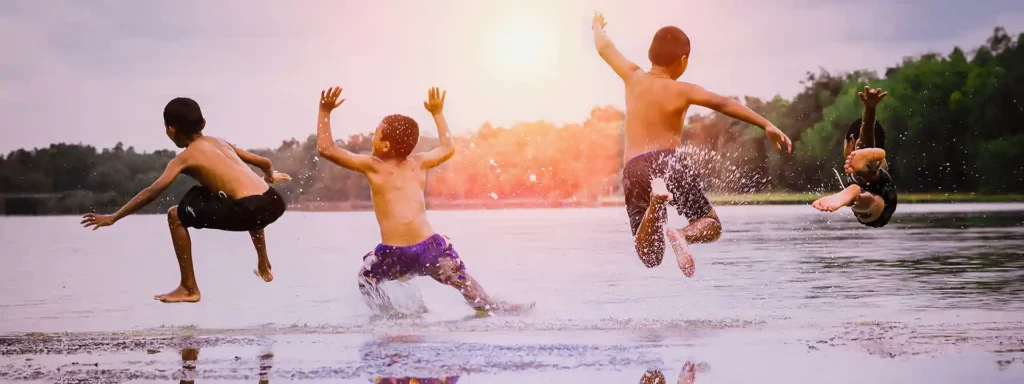Summer is on its way, and camps around the country are beginning to enroll students for outdoor education and summer programs. Many parents are debating whether to send their children to camp this year. Sending a child to camp for the first time can be an intimidating prospect. To help you make an informed choice, here are five distinct benefits offered to campers by outdoor education and summer camps:
1. Camps offer a safe environment where students can exercise outdoors.
In recent generations, there has been a sharp decrease in the amount of time children spend exercising in the outdoors. Part of this reason is because parents want to keep their children safe and are not comfortable letting them go outdoors by themselves. This decrease is also caused by the steady loss of public parks where students can play. Camps solve this dilemma by providing students with a safe space where they can exercise and enjoy nature.
During their formative years, it is important for students to engage in regular exercise and learn healthy habits. This will set them up for success when they become adults.
Attending outdoor education or summer camps helps teach children the importance of staying healthy and active in a fun environment. Camp counselors provide support for their campers, making sure that they are safe while they enjoy the outdoors. With the rising danger of childhood obesity, camps offer an invaluable service, giving children a chance to exercise in the outdoors while still remaining safe.
2. Camps provide an opportunity to learn new skills and engage in new activities.
With increasing budget cuts, public schools are hard-pressed to provide their students with extra-curricular activities. Outdoor education and summer camps offer a solution to this problem.
They are specially equipped for activities that students would otherwise never get to experience.
Camps provide campers with opportunities to learn new skills such as archery, canoeing, fishing, rock-climbing, orienteering, and horseback riding. Since camps are not reliant on government funding, they can afford to offer academic and sports programs to students of all ages and skill levels.
3. Camps allow students to practice valuable socialization skills.
Just as it is important for children to be physically healthy, it is also important for them to learn how to interact with others. While at camp, children have the opportunity to engage with students from different backgrounds. They can form friendships that they would never have the chance to build outside of camp. Campers spend a considerable amount of time directly interacting with their peers, without the pressures placed on them in the classroom environment. Both outdoor education and summer camps emphasize the importance of teamwork. During camp activities, students can learn the different elements of teamwork and their applications to the outside world.
Camps teach students how to engage in constructive conflict-resolution, which will prepare them for life in the professional world.
In addition to working through guided team-building activities, campers can also engage in free play at camp. Free, unrestricted play will help them learn creativity and problem-solving. It also allows children to act like children and enjoy the company of others their age. In a time where children are often forced to grow up too quickly, camp provides them with a safe space where they can befriend others and express themselves without judgment.
4. Campers gain a new appreciation for nature and its benefits.
It is difficult to expect people to value the environment if they are never able to interact with it. While attending camp, children can experience the outdoors firsthand. They can go on guided hikes and learn about their world. Many camps offer lessons in outdoor survival, ecology, and wildlife studies. They teach students how to utilize the resources provided to them by nature. Campers learn to be conscientious citizens who respect the environment.
Studies have shown that children who interact with nature are healthier, happier, and more aware of their surroundings.
They learn to pay attention to everything around them, appreciating nature’s beauty on a new level. This encourages both creativity and a better understanding of how the world works. Through outdoor education, students learn more about science, natural history, and most importantly, themselves.
5. Campers learn self-reliance.
By spending time away from home, campers learn how to operate on their own without having to constantly look to others for guidance. They are taught how to solve problems by using their personal strengths. Interacting with others and learning new skills boosts their confidence. This, in turn, better prepares them for adult life. They become more resilient and are able to cope with stress better than students who do not spend time away from home.
According to Michael Ungar, Ph.D., “summer camps are places where children get the experiences they need to bolster their range of coping strategies”.
Campers are taught how to care for themselves and handle negative emotions like stress or homesickness. They learn positive conflict-resolution strategies. Camp counselors encourage campers to challenge themselves and act with confidence. In doing so, they help students become more independent and self-assured, and as a result, better equipped for life on their own.
Going to camp for the first time can be intimidating. However, the experience is well worth the cost. Camps offer students a chance to enjoy nature, exercise, and learn about themselves and others in an enjoyable, supportive environment. They teach children self-reliance and help equip them for a brighter future.
We can help you find the right camp
If you are still unsure what the correct choice is and what would the best destination be, simply contact us and we will provide you with all the necessary information!
